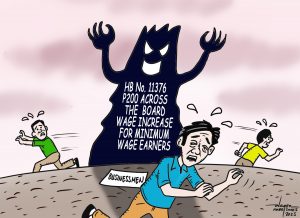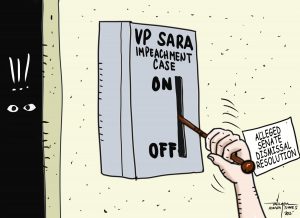Davao City is now making it mandatory for business establishments employing ten or more people to have their workers undergo testing for illegal drug use.
This mandate is the consequence of the passage and implementation of City Ordinance No. 0506-13 or An Ordinance Mandating Random Drug Testing in all Establishments in Davao City. And to ensure compliance by the establishments concerned the city government is making the result of the drug testing a requirement in the acquisition of new, as well as in the annual renewal of business permits.
According to Concepcion Domag, focal person of the City’s Anti-Drug Abuse Council (CADAC) who guested during last week’s edition of the Kapihan sa PIA at a local mall in Buhangin, since the implementation of the ordinance only 20 business establishments have undergone the process and are declared compliant with the local law.
Based on the ordinance number we assume that this was passed by the Sangguniang Panlungsod in 2013 or more than five years ago. But of course we know that many of the city ordinances, some of them very critical based on the needs of the time, are not implemented because of the absence of its Implementing Rules and Regulations (IRRs). We even know of certain ordinances that had been in existence for more than a decade, even outliving its authors, but remained ineffective because these could not be implemented for lack of IRRs.
We assume that Ordinance No. 0506-13 is one of those local laws that were not immediately crafted with IRRs. We base our assumption on the number of business establishments (20) that have complied.
Yes, with only 20 complying, the possibility is that its IRRs were only completed a year or so ago. Had the IRRs of Ordinance No. 0506-13 been prepared by whoever or whichever persons or units at the Sanggunian or at the City Executive Department right after its passage, chances are, businesses with 10 or more workers could already have their employees subjected to the mandatory drug test.
Everybody knows that yearly all existing business establishments have to renew their permits. So, if the drug testing result is a requirement for such renewal and only 20 have complied, then we can assume that all the rest are operating without their renewed business permits.
And if their permits were renewed how come this is allowed if it is so provided in Ordinance 0506-13? The CADAC focal person should have given an explanation why there is hardly any compliance of the local law. That unit in the Mayor’s Office should have to inquire from the City’s Business Permit Division why it has allowed the renewal of the permits of the establishments other than the 20 reported to have complied.
Are there some considerations arranged for the non-complying business establishments to continue operating minus the submission of their drug testing results?
Or, had the City government through the City Mayor, suspended the effectivity of the ordinance for a given period? That is, to give enough time for the business establishments to undergo the many processes prior to full compliance?
We are raising the last question because of a national law that mandates the installation of bigger plates for motorcycles both in front and at the back. The President, who is the father of the Davao City Mayor, has issued a suspension order of the law’s implementation.
We have not heard of any similar report emanating from the office of the city chief executive. That is why we see the need for the CADAC to find out and brief the public why the low compliance and why those who are not complying are still renewed their permit to operate.
With this apparent disregard of an important piece of local legislation, especially in the light of a national effort to rid society of the drug menace, we find it worth sharing the thought of this article we read in an old edition of the magazine New Catholic World. It is titled Accountability and Responsibility by David Ricchio.
“It is important to remember a distinction: the people or situations of our past may be accountable for some of our present distress, but are not responsible for it. To be accountable means to have played a part in the formation of a fear or a deficiency. To be responsible means to have caused it, that is, to be the blame. The past is not causing nor has it caused our feelings.
“As adults, our work is to recognize our pain and to work with it for change. To hold onto it is a choice against change and growth, and for such a choice we are the ones responsible. The work of recovery can never truly proceed as long as anyone else is to blame, because we then become passive victims, unable to help ourselves. Only able (though wounded) adults can do this work for themselves on themselves.”
So, in the case of the very apparent disregard of the mandate of City Ordinance No. 0506-13 who is accountable for it? And who is responsible for the consequences of its non-compliance. CADAC should endeavor to know and advise the public about it.
We want meaningful change? Then together let’s fight against the status quo; of working for change to happen.



